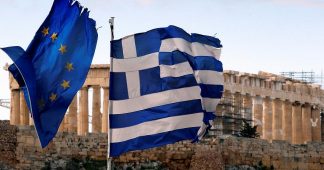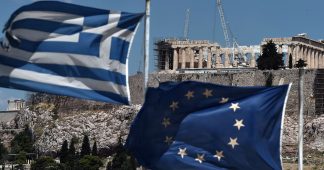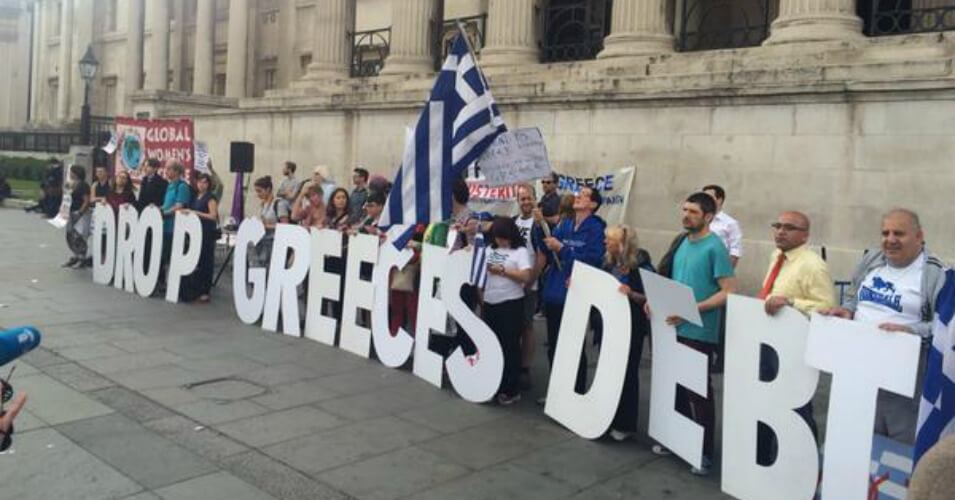By Dimitris Lymberopoulos
Economist
Greece’s debt isn’t about money
Greece’s debts really are unsustainable. This is just basically not a debatable point. The reason it’s not genuinely shocking to hear that Merkel privately admitted this is that nobody really disputes it. Greece’s creditors know that they aren’t going to be paid back. But they want the debt to stay on the books anyway.
Why?
Well because as long as the debt is on the books, Greece needs to keep asking for per mission to roll the debt over and failure to pay debts can be used as a political trigger for forcing Greece out of the Eurozone. The debt, in other words, isn’t about money. It’s about political control. If the debt is formally forgiven then not only do Greece’s creditors need to write down some money, but they need to let Greece go on its merry way. If the debt is merely subjected to repeated rounds of extend and pretend then Greece’s creditors get to keep making various demands about structural reform.
Source:VOX,Jul 2, 2015
Β.FAILURES OF IMF ON GREECE AUSTERITY ROGRAMS.
1.IMF admitted it had failed to realize the damage austerity would do to Greece as it catalogued “mistakes”made during the bailout of Greece.
2.In an assessment of the rescue conducted jointly with the ECB (European Central Bank) and the European Commisson, the IMF said that it had been forced to override its normal rules for providing financial assistance in order to put money into Greece.
3.IMF officials had severe doubts about whether Greece Debt would be sustainable even after the first bailout was provided in May 2010 and only agreed to the Plan because of fears of contagion to other European economies.
4.While IMF succeeded in keeping Greece in the Eurozone, however, it admitted the bailout included notable failures:
*Market confidence was not restored, the banking system lost, at least 40% of its deposits and the economy encountered a much deeper than expected recession with exceptionally high unemployment.
*Government officials in Athens said that the package provided proved that the price exacted for the 110 Bn euros emergency package was too high for a country like Greece, beset by massive Debts, Tax evasion and a large black economy.
*Under the weight of such measures—applied across the board and hitting the poorest—the economy was always bound to dive into an economic death spiral.
*Troika officials refused to accept that the program was simply off-target by hiding their failure to implement structural reforms.
5.IMF approved an exceptionally large loan to Greece under a stand-by agreement in May 2010, despite having considerable misgivings about Greece Debt sustainability. The decision required IMF to depart from its established rules on exceptional access.
6.IMF officials were taken aback by the much bigger than expected slump in the Greek economy, while it thought the Greek economy would contract only by 5,5%, it finally had contracted by 17%.
7.There was a tension between the need to support Greece and the concern that Debt was not sustainable with high probability (a condition for exceptional access).
In response, the exceptional access criterion was amended to lower the bar for Debt sustainability, as is required for all IMF programs.
8.IMF is critical of Senior officials in Brussels and European capitals who were saying that Greece would fare better outside the Euro. Confidence was also badly affected by domestic social and political turmoil and talk of a Greek exit from the Eurozone by European policy makers.
9.IMF made decisions in a structured fashion, while decision-making in the Eurozone spanned heads of state and multiple agencies and was more fragmented.
10.IMF(then)Managing Director Christine Lagarde declared publicly that<<Year 2011 was a lost year, partly because of miscalculations by EU and IMF.
C.THE DIRTY GAME AGAINST GREECE.
*Our European partners set as their main priorities defending their financial interests. Proof of that is the fact that IMF chief economists knew very well what it was about, from the beginning. They were more than certain that this program for Greece had no chances of success whatsoever.
*Representatives of many countries in the IMF, (such India, Brazil, Argentina, Russia, Switzer land, etc) put the idea of not having IMF to participate in such program for Greece, unless it was done in combination with direct and immediate restructuring of this Debt, that it would render it viable. However, the alternate Director of IMF Mr. Lipsky, warned them, that this was impossible to do it, since it was not accepted by the Greek government itself.
*Later ,many details emerged fron the closed door meetings at IMF. Specifically, the then Head of IMF Mr. KAHN, was trying repeatedly to convince Greek Prime Minister George Papandreou, about the urgent necessity, of going ahead with the proposed plan but to no avail. It was also found out, that Papandreou was hesitant to go ahead, since he was under tremendous pressure by his European partners(mainly Germany and France)not to do it. Undoubtedly, their priority, was to safeguard the stability of Euro, and the function of Eurozone as a whole. It goes without saying that another major reason why they refused the Greek restructuring was RESCUING the European banks(German ,French and Dutch, alike),which were carrying in their portfolios ,large amounts of Greek bonds, in the amount of 122 Billion euros.
Hypocritically, these banks although had provided assurances, that in order to avoid an immediate restructuring of debt, which would deal on them a heavy financial blow, they would keep quite and hold these bonds, instead, for a while. However, once the First Memo as well the respective Loan Agreement were signed, they immediately rushed in,selling off the Greek bonds, thus getting rid off almost half of these, reducing their holding value from 122 Billion to 66 Billion Euros. This was their ultimate goal !…
D.HISTORY OF THE GREEK PUBLIC DEBT.
*On March 9th 2012,the “Restructuring” of the Greek Public Debt was realized. Thus, the total outstanding amount of Debt, in February 2012 was reduced by 106 Billion euros, according to Lenders Plan. However this decrease did not affect the Status of Public Debt, since it was agreed upon, that a supplemental loan of 130 Billion euros should be granted, which included as well the initial amount of 48 Billion, which was used for the banks recapitalization process.
It is clearly, then, concluded that this agreement was one more ploy of the Lenders, aiming a the rescuing of heir banks and the minimization of their financial losses. Chief orchestrator was the director of the International financial Institute Charles Dalara. So now, The profile of the Greek Public Debt was transformed from bonds (year 2010) to Loans (year 2014).From now on, the Ruling Justice System ,was no more the Greek one but the English one (in favor of the Lenders side).
*Accordingly, during the period 2010—2014, there had been a cumulative decrease of the GreeK GDP amounting to 60 billion euros, because of the “engineering” of the Greek Debt.
So, according to this Agreement, there was a need to liquidify (sell –off),Public
Property (Property owned by the State), based on the program drafted by the Lenders, recorded in the State Budget of the year 2012 and targeted to bring in revenues amounting to 50 billion euros, against, the claims of the Lenders. However, his resulted, in the doubling of the recorded Public Debt, from 301 billion euros in 2009 to 334 billion in 2018 and 395 in 2021.
*However, the Lenders goal is not clearly to reduce the Greek Public Debt, but to increase it, using this fact as a pretext for looting this Property, without, having to deal with the Greek governments objecion which are silent and totally obedient. Therefore the current political system in Greece stay as nothing is happening to the country, absolutely subservient to the Troika and the Lenders.
*Greece today is in crossroads: Either she will continue applying the failed programs dictated by the Lenders or will go ahead decisively and methodically, to break the “chains” of this Debt, planning its own program of national priorities.
*If Lenderes were really interested in the development of Greece, then the Memo they engineer ed would have targeted the development of the Greek Economy and would have taken care of addressing all mishaps, not just striving to strangle it. Because, if restructuring of Debt was done early—as it is internationally practiced—our Eurozone parners refused to do so, since their only priority was the rescuing of their banks. So, when finally decided to move ,it was too late!…
E. PUBLIC STATEMENTS ON THE CRIMINAL ACTS OF IMF AND EUROPEAN PARTNERS REGARDING GREEK DEBT.
1. BARACK OBAMA,FORMER US PRESIDENT.(FROM HIS RECENT BOOK).
* In the year 2010,the German and French Banks, were loaded in their portfolios with an inconceivable amount of Greek bonds, reaching 120 billion euros.
If Greece had opted for the bankruptcy method, these banks should have been dealt with a significant “haircut” blow, then, recording in their books tremendous losses, pushing, then, in a very difficult situation and forcing them to absorb it.
*Thus, the Lenders engineered a scheme called “Operation Loan Agreement”.
2.There are many culprits to be blamed. Finally, Germans and French succeeded in rescuing their banks, abusing the term “insider information” to their benefit, by getting rid of the “toxic Greek bonds”, that is, those which expired earlier than the due date being paid off fully, while the later ones, were paid, being subject to “haircut”.Thus, after this “Loan
Agreement”, the Greek Public Debt from being owed to Private individuals was transformed to Debt owed to the States of the Eurozone. Unavoidadly, the Greek banks were forced by necessity to be repeatedly recapitalized with greek taxpayers money. This was not the case, however, with their German and French banks, who were strongly aided by their countries, which made “good use” of the lax Eurozone rules, escaping to pay the price of their gambling practices on those Greek bonds.
* Greece should go to the International Courts demanding multibillion compensations for the damages incurred.
2.HELMUT SCMIDT, former chanceller of Germany:
- “We need a European investment plan to the benefit of Greece, to be financed not only by Germany but also by the remaining European countries and also reaching an agreement for the write-off of a big part of the accumulated Greek Debt”.
2.In reality, much of the European money, intended to help Greece, never reached its destination ,found only in the Accounting books. You can not touch it.
3.German people have not been bleeding at all because of Greece.
4.European Union has acted inconsistently not only in the case of Greece but also in the case of Russia regarding the war with Ukraine.
5.We know that Greece will never be able to pay off that size of Debt. I strongly believe that the Greek Debt must be officially be written off.
F.TERMS OF LENDERS IMPOSED ON GREECE
-Abdicating national sovereignty and the protection provisions provided by the International Law
-All public property under Lenders mortgage
-Economic policy of Greece under strict Lenders control.
All above consistute the term “High treason”.
-Application of the executive deeds in conformity with the Lenders terms results in gross penal crimes. This is also a violation of Human rights of the U.N Charter.
Moreover all above run contrary to the Constitution, violating International Law and are
unfounded, being null and void.
- G. RULING OF THE CONSTITUTIONAL COURT OF GERMANY ON WOLFGANG SCHAEUBLE DECEITFUL HANDLING OF GREECE LOAN AGREEMENTS.
“Wolfgang Schaeuble, the German minister of Finance, had put in danger the future of the Eurozone. Eventual exit of Greece from the Eurozone would have had unforeseen consequences for the European cooperation but also for the German State Budget. Such tactics and lines of negotiations are not allowed to be included as far as the European negotiations are concerned, without obtaining the prior approval of the German Parliament”.
Also read
Greece: a member of EU and NATO destroyed by Germany, the EU, the IMF and the US!
We remind our readers that publication of articles on our site does not mean that we agree with what is written. Our policy is to publish anything which we consider of interest, so as to assist our readers in forming their opinions. Sometimes we even publish articles with which we totally disagree, since we believe it is important for our readers to be informed on as wide a spectrum of views as possible.











